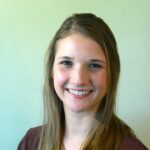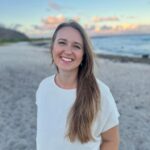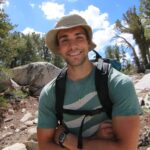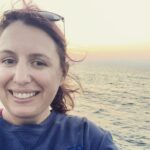The Mid-Atlantic Regional council on the Ocean (MARCO) hosted “How Microplastics Impact Marine Species and Habitats” on June 9. Expert speakers discussed the morphologic, toxicologic, and biogeochemical effects of microplastics across field and lab-based studies.
The webinar was moderated by EPA Region 3 Senior Watersheds Coordinator Kelly Somers and featured presentations by Oregon State University Postdoctoral Researcher Julia Fontana, Virginia Institute of Marine Science Assistant Professor Meredith Seeley, and Providence College Postdoctoral Teaching Fellow Hayden Boettcher. Scroll below for speaker bios.
The webinar was the third in a four-part webinar series exploring the impact of microplastics and microfibers on coastal and ocean resources in the Mid-Atlantic region. Leading researchers and policy experts will discuss key concerns, research gaps, and emerging solutions to this growing challenge. These sessions aim to share the latest scientific findings, spark conversations, and identify actionable steps for regional stakeholders.
Visit the Marine Debris Work Group web page for recordings of previous webinars and updates on future installments in the series. Questions may be directed events@midatlanticocean.org
Speaker Bios
Dr. Julia Fontana, Postdoctoral Researcher, Oregon State University
 Julia is a postdoctoral scholar at Oregon State University studying zooplankton ecology, with a focus on how anthropogenic stressors impact zooplankton physiology. Her research spans both estuarine and polar ecosystems. She earned my PhD from the University of Delaware, where she investigated loading of microplastics through terrestrial watershed modeling, the aggregation of microplastics in estuarine systems, and their ingestion and physiological impacts on estuarine organisms in the Delaware Bay. Julia’s current work focuses on energy allocation and reproductive development in Antarctic krill, exploring how krill prioritize energy reserves under varying food conditions.
Julia is a postdoctoral scholar at Oregon State University studying zooplankton ecology, with a focus on how anthropogenic stressors impact zooplankton physiology. Her research spans both estuarine and polar ecosystems. She earned my PhD from the University of Delaware, where she investigated loading of microplastics through terrestrial watershed modeling, the aggregation of microplastics in estuarine systems, and their ingestion and physiological impacts on estuarine organisms in the Delaware Bay. Julia’s current work focuses on energy allocation and reproductive development in Antarctic krill, exploring how krill prioritize energy reserves under varying food conditions.
Dr. Meredith Seeley, Assistant Professor, Virginia Institute of Marine Science
 Meredith Evans Seeley is an Assistant Professor at the Virginia Institute of Marine Science (VIMS) and the Batten School of Coastal and Marine Sciences at William & Mary. Dr. Seeley’s lab group studies the sources, fate and effects of pollutants in aquatic ecosystems. This research is focused on organic contaminants, including plastics (macro, micro and nano), plastic additives, petroleum from oil spills, tire wear particulate and per- and polyfluoroalkyl substances (PFAS). In the lab, her team enjoys developing analytical chemistry tools to better characterize the chemical and physical aspects of these contaminants. This includes understanding how contaminants evolve in the environment over time, toward the goal of describing an organisms’ effective exposure. Her team also uses this research to design relevant ecotoxicology studies, which often consider multiple drivers of ecosystem stress (e.g., other contaminants, pathogens, etc.). Overall, Dr. Seeley is driven by the need to develop specific and realistic pollutant mitigation strategies, capable of having the greatest impact for maintaining healthy coastal and marine environments.
Meredith Evans Seeley is an Assistant Professor at the Virginia Institute of Marine Science (VIMS) and the Batten School of Coastal and Marine Sciences at William & Mary. Dr. Seeley’s lab group studies the sources, fate and effects of pollutants in aquatic ecosystems. This research is focused on organic contaminants, including plastics (macro, micro and nano), plastic additives, petroleum from oil spills, tire wear particulate and per- and polyfluoroalkyl substances (PFAS). In the lab, her team enjoys developing analytical chemistry tools to better characterize the chemical and physical aspects of these contaminants. This includes understanding how contaminants evolve in the environment over time, toward the goal of describing an organisms’ effective exposure. Her team also uses this research to design relevant ecotoxicology studies, which often consider multiple drivers of ecosystem stress (e.g., other contaminants, pathogens, etc.). Overall, Dr. Seeley is driven by the need to develop specific and realistic pollutant mitigation strategies, capable of having the greatest impact for maintaining healthy coastal and marine environments.
Dr. Hayden Boettcher, Postdoctoral Teaching Fellow, Providence College
 Dr. Hayden Boettcher is a marine scientist whose doctoral research focused on the distribution and physiological impacts of microplastic debris in the Delaware Bay ecosystem. Specifically, his work addressed three key questions: 1. Do microplastics and planktonic crab larvae overlap in space and time in the marine environment; 2. Are crab larvae ingesting microplastics in their natural habitat, and if so, to what extent; and 3. In controlled laboratory settings, how does microplastic exposure affect the growth and development of crab larvae—and how do these effects compare to those caused by similarly sized natural particles, such as sand grains? Dr. Boettcher earned bachelor’s degrees in zoology and conservation biology from the University of Wisconsin–Madison, and his Ph.D. in marine sciences from the University of Delaware. He is currently a Teaching Postdoctoral Fellow at Providence College. In addition to his research, Dr. Boettcher is deeply committed to education and is passionate about training the next generation of marine scientists. He is actively building a career dedicated to this goal.
Dr. Hayden Boettcher is a marine scientist whose doctoral research focused on the distribution and physiological impacts of microplastic debris in the Delaware Bay ecosystem. Specifically, his work addressed three key questions: 1. Do microplastics and planktonic crab larvae overlap in space and time in the marine environment; 2. Are crab larvae ingesting microplastics in their natural habitat, and if so, to what extent; and 3. In controlled laboratory settings, how does microplastic exposure affect the growth and development of crab larvae—and how do these effects compare to those caused by similarly sized natural particles, such as sand grains? Dr. Boettcher earned bachelor’s degrees in zoology and conservation biology from the University of Wisconsin–Madison, and his Ph.D. in marine sciences from the University of Delaware. He is currently a Teaching Postdoctoral Fellow at Providence College. In addition to his research, Dr. Boettcher is deeply committed to education and is passionate about training the next generation of marine scientists. He is actively building a career dedicated to this goal.
MODERATOR: Kelly Somers, Senior Watersheds Coordinator, EPA Region 3
 Kelly Somers is a Senior Watersheds Coordinator at the US Environmental Protection Agency Region 3 Mid-Atlantic Office. She leads the EPA’s regional Trash Free Water and microplastic program where she works with partners and stakeholders to address the emerging issues trash pollution and microplastics may be having on watersheds and their resources. Additionally, she serves as the acting chair of the Chesapeake Bay’s Plastic Pollution Action Team.
Kelly Somers is a Senior Watersheds Coordinator at the US Environmental Protection Agency Region 3 Mid-Atlantic Office. She leads the EPA’s regional Trash Free Water and microplastic program where she works with partners and stakeholders to address the emerging issues trash pollution and microplastics may be having on watersheds and their resources. Additionally, she serves as the acting chair of the Chesapeake Bay’s Plastic Pollution Action Team.
